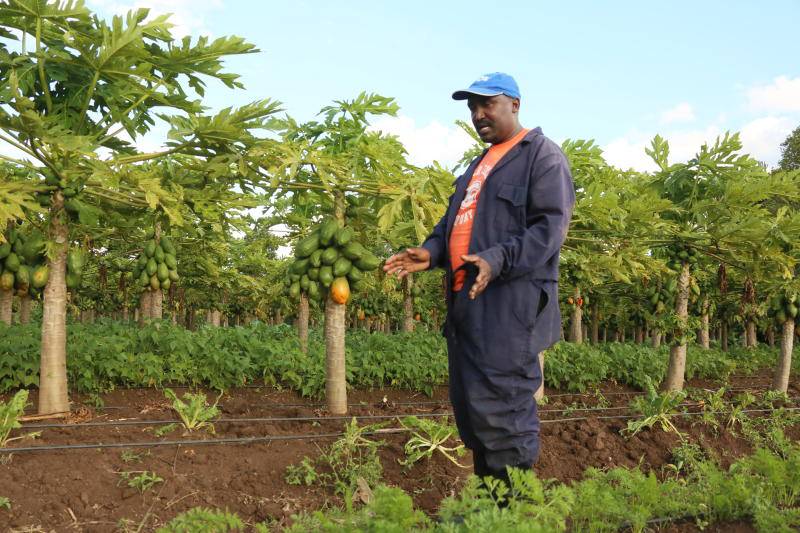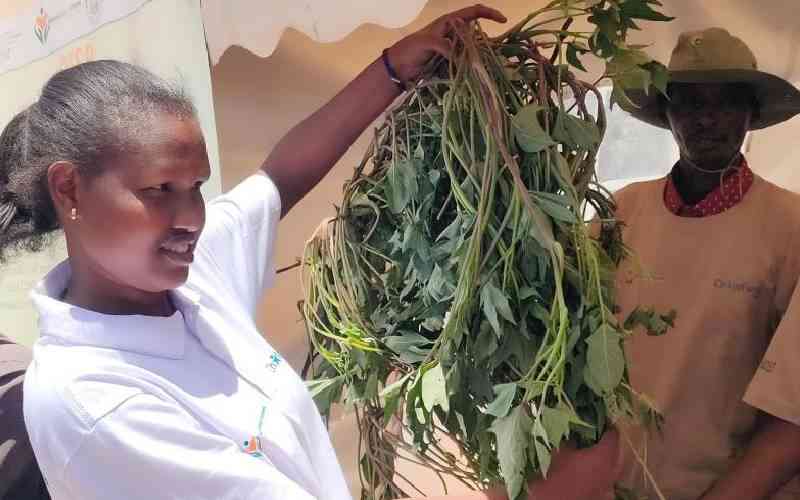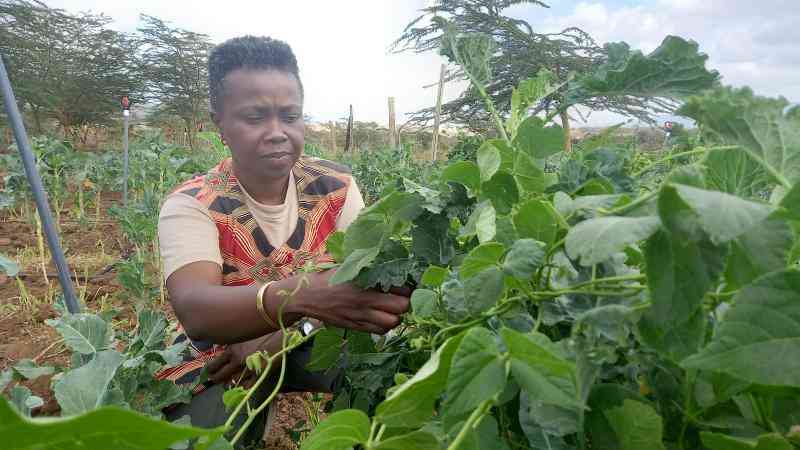
Three years ago, David Wachira (pictured) had a terrible stomach ache after eating sweet potatoes from his farm.
His family too, and several of his loyal customers complained of the same problem having eaten the produce.
After several trips to the doctor, Wachira discovered that he had severe food poisoning.
Apparently, the soils on his 16-acre farm were full of chemicals and this had been transferred to the sweet potatoes.
“The sweet potatoes had absorbed chemicals over the years and once consumed they made us sick. To avoid such an incident in future, I decided to go organic to produce clean and natural food,” Wachira says.
This is how he started Fazenda Organico in Nyeri town, an outlet that sells purely organic foods.
Chemical build up
To go large scale, he partnered with two investors and engaged agricultural experts to help him revive the soils and clear the chemical build up.
“It took months but we were advised to plant sweet potatoes which would absorb the chemicals. After several soil tests, it was confirmed that the soils were clean,” he says.
To transform the farm into a completely organic ecosystem he went 100 per cent natural.
He first prepared his own compost manure and to hit that goal he invested in 400 free range (Kienyeji) chicken, 60 rabbits, 20 goats, and cows, that produce the same. The animals are his constant source of manure.
“Rabbit urine is collected from the rabbit pens because it is rich in nitrogen, the chicken and goat manure is also mixed into the compost to enrich it,” Wachira points out.
The meat from rabbits, chicken and goats is sold at the organic produce shop, while milk is pasteurised before it hits the market.
Stay informed. Subscribe to our newsletter
“We pasteurise our milk which is about 250 litres a day and take it to the dispenser at the shop where it is sold at Sh50 a litre,” he says.
To ensure the milk is organic, Wachira buys ingredients for the animal feeds and constitutes it at the farm.
As part of the organic manure, he uses a concoction of liquid tea which is made from chicken manure, soaked in stinging nettle, teathornia plants which is fermented in drums.
The farm is divided into various sections to accommodate horticultural crops.
“Each season, we grow capsicum, carrots, coriander (dhania), Chinese cabbages, sukuma wiki, spinach, passion fruit, pawpaw, lettuce, spring onions, tree tomatoes, sweet potatoes and traditional vegetables,” says Wachira,
The farmer has intercropped the crops with two paw paw varieties — red lady and royal.
Wachira has planted 4,000 pawpaw trees with each producing 100 fruits during the season.
“A kg of paw paw fruit can be sold at Sh50, which means one acre can earn the farm an average Sh20 million in one season,” he says.
One of the reasons many farmers shy away from organic farming is because of the many pests and diseases difficult to manage naturally. So how does he do it?
To keep away pests and disease, Wachira uses several spices which he has planted in between the crop beds such as rosemary, mint and Mexican marigold weed and pyrethrum.
Natural pest control
“The strong smell from the plants acts as a pest repellent, warding off insects such as aphids,” Wachira says.
The crops are carefully monitored for blight and other diseases and if need be Wachira uses organic solutions made up of boiled paw paw leaves, aloe vera, pepper, garlic and pyrethrum.
“This keeps the crops healthy without introducing chemicals to the vegetables and fruits,” he says.
The challenges
Another challenge is middle men along the value chain and to overcome that he deals directly with customers.
“Once I build trust I am guaranteed of a market. It is vital to create trust between clients and the farm to sell your organic produce. Organic farming is a new concept and people want to trust what they are buying is indeed organic and they sometimes want to visit the farm to confirm,” he says.
Transition from chemical based farming to fully organic has been a huge task.
“Getting rid of chemicals in the soil was no mean feat, it took a lot of research and patience and since it was not something I had done before. It was a herculean task,” Wachira says.
It took eight months to a year, to regenerate the nutrients and clear chemical residue in the soils.
During that time he had no produce except the sweet potatoes which he had been advised to plant by a consultant agronomist.
“Sweet potatoes are legumes and they have properties that help balancing the PH of the soil and that is what helped us to reduce the toxicity in our soil,” he explains.
According to a paper published in the springeropen.com on the chemical and biological technologies in Agriculture, legumes fix the atmospheric nitrogen, release high-quality organic matter in the soil and facilitate soil nutrients’ circulation and water retention.
According to the report “Legume-based systems improve several aspects of soil fertility.
Marketing was also an issue because it is not easy to tell if a product is genuinely organic from the physical look.
“Many people market their produce as organic which is not true. This is worsened by the fact that there is lack of information on what is organic and what is not. It takes time before an organic farmer secures a loyal base of clients who spread word around,” he points out.
In Nyeri town, Wachira’s shop is one of the few that sells certified organic farm produce.
Agronomist and county executive for Agriculture James Muchiri says lack of a secure market is another challenge.
Penetrating the market
Muchiri says although many investors would want to tap into this venture, the productivity per unit is not viable for mass production.
He says most farmers who undertake organic farming in Nyeri County do so on small scale or consumption at home.
These farmers are also competing against mass produced crops sold cheaply in the markets.
Without a ready market willing to trust the farmer and also has higher spending power, the farmer suffers huge losses.
“The losses organic farmers experience would only be commercially viable if they were growing the food for a customer willing to pay premium prices for the food they consume,” he says.
Wachira says though it has potential, several factors are hindering the growth and adaptation of a fully organic farming sector.
Challenges notwithstanding, the farmer has big plans for the future.
“I plan to open up more outlets because the demand for organic produce is high and we cannot satisfy the market with just one shop,” Wachira says.
 The Standard Group Plc is a
multi-media organization with investments in media platforms spanning newspaper
print operations, television, radio broadcasting, digital and online services. The
Standard Group is recognized as a leading multi-media house in Kenya with a key
influence in matters of national and international interest.
The Standard Group Plc is a
multi-media organization with investments in media platforms spanning newspaper
print operations, television, radio broadcasting, digital and online services. The
Standard Group is recognized as a leading multi-media house in Kenya with a key
influence in matters of national and international interest.
 The Standard Group Plc is a
multi-media organization with investments in media platforms spanning newspaper
print operations, television, radio broadcasting, digital and online services. The
Standard Group is recognized as a leading multi-media house in Kenya with a key
influence in matters of national and international interest.
The Standard Group Plc is a
multi-media organization with investments in media platforms spanning newspaper
print operations, television, radio broadcasting, digital and online services. The
Standard Group is recognized as a leading multi-media house in Kenya with a key
influence in matters of national and international interest.










